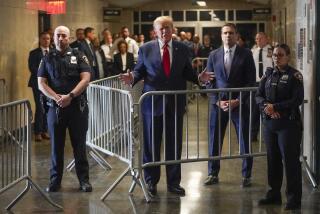Sentencing of Man in LAX Bomb Plot Delayed
- Share via
SEATTLE — A federal judge surprised prosecutors and defense lawyers Wednesday by delaying the sentencing of would-be millennium bomber Ahmed Ressam, saying he wanted to give the terrorist one more chance to cooperate and testify against former associates.
U.S. District Judge John C. Coughenour made his decision after listening to more than three hours of arguments about what kind of sentence Ressam deserved for plotting to blow up Los Angeles International Airport in December 1999.
The judge asked defense lawyer Thomas W. Hillier II to consult with Ressam about the possibility of resuming his cooperation with the government -- after refusing for months to do so -- in exchange for a shorter prison term.
After an eight-minute whispered exchange between Ressam, his lawyers and a translator, Hillier said that the defense favored a postponement. The judge set sentencing for July 28.
In the defendant’s reactions, Coughenour said, “there’s reason for optimism that his cooperation with the government will improve. The world won’t come to an end if we continue this for three months. But it could end up a better place if we wait.”
Ressam displayed no emotion after hearing the judge’s order. Hillier, the Federal Public Defender for the Seattle area, and his team of defense lawyers appeared buoyed by the unexpected development, but said they would have no comment.
Reaction from the prosecution was guarded. U.S. Atty. John McKay said Coughenour’s decision showed the American judicial system at its best. But, he added, he was skeptical that Ressam -- an Algerian expatriate who last lived in Montreal -- would change his mind and resume talking to authorities.
“The court has given him one final chance,” McKay said outside the federal courthouse. “We hope he will take the opportunity provided him, but we’re not particularly optimistic.”
Ressam, 37, became a vital witness in the war on terrorism after his April 2001 conviction in the LAX plot. A U.S. Customs agent had stopped Ressam’s explosives-laden car when he tried to enter Washington state from Canada by ferry shortly before the millennium celebrations.
But Ressam stopped cooperating in recent months.
In their arguments Wednesday before Coughenour, prosecutors accused Ressam of duplicity and of reneging on his signed plea agreement.
McKay urged Coughenour to sentence Ressam to at least 35 years in federal prison, which is eight years more than the Justice Department had signed off on in the 2002 plea deal.
That sentence, the prosecution said, was warranted in light of Ressam’s refusal to assist in the pending cases against two alleged associates in the millennium plot who were awaiting extradition from Britain and Canada.
The two men -- an alleged Al Qaeda regional chieftain in Europe nicknamed Abu Doha and Algerian militant Samir Ait Mohammed -- are “international terrorists” who pose serious threats to U.S. national security, Manhattan-based Assistant U.S. Atty. Robin Baker said.
Baker, who has helped supervise Ressam’s cooperation with other governments, told Coughenour that although the terrorist had provided significant assistance to authorities, defense lawyers had overstated the degree to which his information led to arrests and convictions.
But Baker also said that Doha and Mohammed had been indicted on the strength of information provided by Ressam, and that they would have to be set free because of his refusal over the last 18 months to cooperate in efforts to prosecute them.
“If Mr. Ressam is willing to cooperate, we shouldn’t be here,” he said. “We should wait to see what his cooperation would be.”
Ressam’s lawyers reacted angrily to Baker’s assessment, saying that the government frequently had praised their client for his help. Hillier blamed the Justice Department and FBI for Ressam’s refusal to continue cooperating, telling Coughenour that the government’s overly aggressive interrogations and false promises of a shortened sentence had turned a once-enthusiastic witness into a traumatized wreck.
The defense asked Coughenour to sentence Ressam to as little as 12 years in prison, given his extensive cooperation with authorities in the U.S., Canada, Germany, Britain, France, Italy and Spain.
The judge, known for being blunt, told Hillier he was “mystified” that Ressam insisted on going forward with his sentencing without at least trying to meet the government requests for additional cooperation.
Hillier responded that Ressam had “lost all hope” that the Justice Department would treat him fairly and lower his sentence, no matter what kind of assistance he provided.
The judge told Hillier to discuss the matter with his client, and to ask Ressam whether he would agree to resume cooperating.
“You’re putting us on the spot and my client in an awkward position here,” Hillier said.
“I understand that,” Coughenour said. “It’s kind of fun.”
After Ressam shrugged and nodded his head in apparent approval, Hillier said: “We’re asking for the time so we can work with Ahmed and see if he wants to go forward.”
Legal experts said Coughenour’s decision seemed appropriate.
“It’s always in the public interest to get full cooperation, especially from someone who has the kind of information everyone believes that Ressam has,” said Mary Jo White, who presided over Ressam’s cooperation as the U.S. attorney for Manhattan before leaving in 2002. “Presumably the judge had that in mind when he made his decision.”
White said she could not discuss details of how much help Ressam had provided. But when he first began cooperating in May 2001, she said, prosecutors and the FBI were ecstatic.
More to Read
Sign up for Essential California
The most important California stories and recommendations in your inbox every morning.
You may occasionally receive promotional content from the Los Angeles Times.













